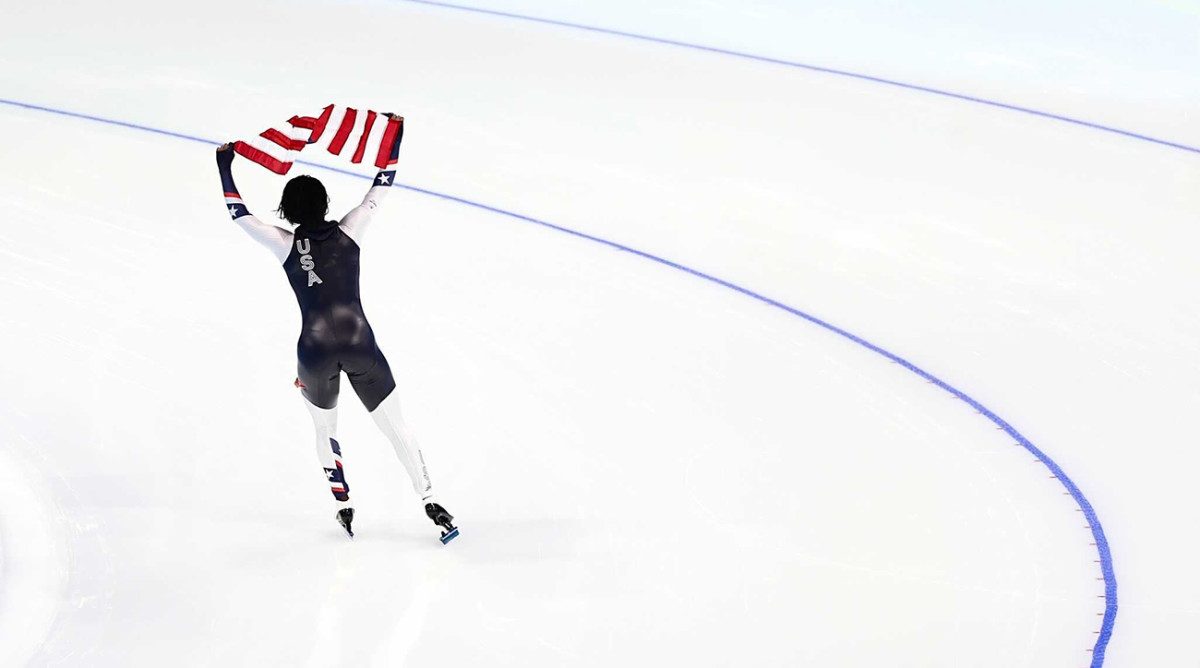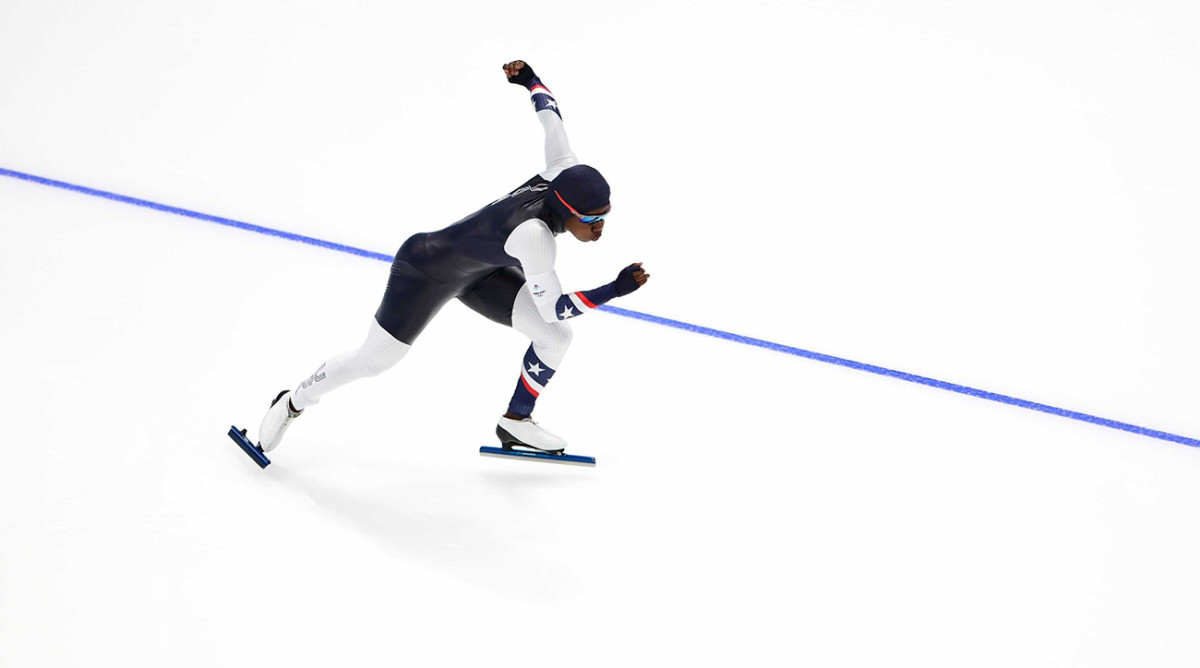Team USA’s Erin Jackson Wins Historic Gold Medal in Speedskating
BEIJING — Erin Jackson is never happier than when she is thinking. She holds two degrees and is on her way to a third. Her family lovingly calls her a nerd. She sometimes refers to her job—at which, on Sunday night, she was crowned best in the world—as “skating in circles.”
It was not surprising that she won the 500-meter speedskating event in 37.04 seconds, becoming the first Black woman to win an individual gold medal at the Winter Olympics and the first American woman to win speedskating gold in two decades. What was surprising was what ran through her mind as she stood atop the podium afterward.
“I think I was still a bit blank at that point,” she said. “Just, like, ‘Holy crap.’ And ‘Wow.’ And ‘This is awesome.’ Very simple thoughts.”

Five weeks ago, Jackson, 29, was not even sure she would make it to Beijing. She had won four of the eight World Cup races in the 500 meters, and she was ranked No. 1 in the world in the 500 meters, but she still had to finish in the top two at U.S. trials in the event. Midway through her race, she slipped—not enough to fall, but enough to cost her nearly a full second. She finished third by four-tenths of a second.
In the aftermath, she wondered briefly whether she should have flopped, since a fall triggers an automatic reskate. “But I think it’s a bad idea to encourage that,” she said then.
Brittany Bowe, who finished first, also had qualified for the Olympics in the 1,000 meters and the 1,500 meters, which are her specialties. She was not a medal contender in the 500. Before she left the rink that night, she promised Jackson that she would give up her spot in that event. They made it official two days later, so that Jackson could hear her name read with the rest of the team at the champagne celebration.
“In my heart, there was never a question that I would do whatever it took, if it came down to me, to get Erin to skate the Olympics,” Bowe said. “No one is more deserving than her.”
Jackson has adored Bowe, who is four years older, for almost as long as she can remember. (This was news to Bowe. “It's actually been a pretty humbling experience going through what we’ve been through the last month to hear how I inspired her and mentored her,” she said Sunday.) Both grew up in Ocala, Fla., as inline speedskaters. Both rose to the top of that discipline. Both eventually came to the same realization: Inline speedskating is not an Olympic sport … but ice speedskating is.
After waffling for a year or two—the two sports are more different than they seem, plus ice speedskating is cold—Jackson made the switch for good in 2018, just four months before that year’s Olympic trials. Her coach, Ryan Shimabukuro, signed her up for the race to get her some reps against elite competition. “I didn’t even tell my dad and my family that I was going to the Olympic trials, because to me, it wasn’t the Olympic trials,” she told SI in December. “I was going to do this race that just happened to be a place where other people were trying to qualify for the Olympics.”
Instead she put together the race of her life to that point and made the team. Shimabukuro tried to keep expectations reasonable. His message: Congratulations, but you’re still not that good.
Jackson finished 24th in PyeongChang. The next season, she started racking up top-10 finishes competing against skaters who had been on ice for a decade longer than she. After her first World Cup win, she thought, That’s strange. After the second, she thought, O.K., let’s do this.

Since then, she has improved nearly every time she’s taken the ice. Her power, natural feel for the sport and work ethic have combined to compensate for her inexperience. As it turned out, she would have made the Olympic team even without Bowe’s sacrifice; after some nations declined their spots, the U.S. was allocated a third slot, which went to Bowe. She skated in the fifth pairing, finished 16th and got off the ice in time to spend Jackson’s pairing, the 14th out of 15, sprinting around the oval, screaming gibberish.
Jackson watched the last pairing knowing she was guaranteed a medal; when both skaters finished three-quarters of a second behind her time, she immediately burst into tears. She accepted hugs from Bowe—”I’m so proud of you,” Bowe gushed; “Thank you,” Jackson sobbed. “Thank you, thank you, thank you”—and from Shimabukuro, who kept his comments short. “You’re an Olympic champion,” he said.
This is the outcome Jackson envisioned when she took this past year off from college—she is working on an associate’s degree in kinesiology to add to her bachelor’s in materials science and engineering and an associate’s in computer science—to train with Shimabukuro in Salt Lake City. Not because school was getting in the way of skating, but because skating was getting in the way of school. She wanted to be able to give her classes her full attention, and she knew she could not do that until the Olympics were over.
She hopes to inspire Black children who don’t often see Winter Olympians who look like them, she said, and also “kids who want to have more priorities in life—you know, school [before sports].”
Jackson wants to combine her fields of study by developing new sports equipment or prosthetics. But she also has a lot left to do in skating. In December, Shimabukuro told SI that Jackson was still “in her infancy in the sport.” As late as this week, she was trying to refine her start; she believes she is just now getting the hang of it. Reminded of those comments on Sunday, Shimabukuro smiled. “She graduated first grade today,” he said. That’s a scary thought for everyone else on the oval.
What’s next? She’ll have to think about it.
More Olympics Coverage:
• Erin Jackson Is Ready to Make a Statement on Ice
• Erin Jackson Becomes First Black Woman to Win Speedskating Medal
• Kaillie Humphries and Elana Meyers Taylor Steer the Way for Women in Bobsled
